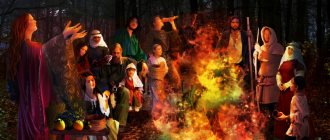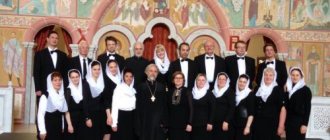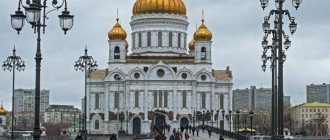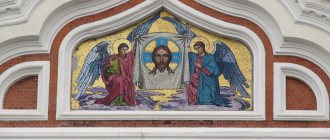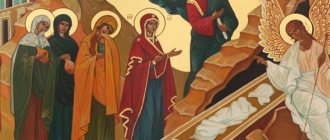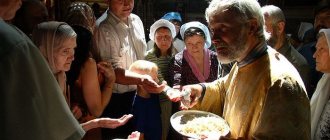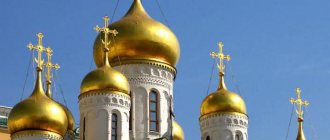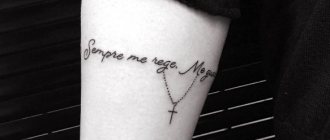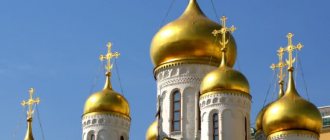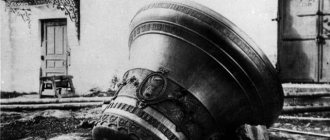There is a large amount of different literature describing the life of the Bulgarian soothsayer. The texts are monotonous and rely on external events and ordinary emotions. The attitude of the Orthodox Church towards Vanga was formed under the influence of eyewitnesses, literature and analysis of her actions.
Even the most detailed books do not provide a full disclosure of the personality of Vanga, who gained popularity and became known thanks to magazine articles. The Church claims that the activities of the Bulgarian seer were in no way consistent with the canons of Orthodoxy and the moral foundations of the Christian religion.
Famous soothsayer
The biography of this amazing woman is told in many sources. For example, information about her is contained in the book “50 Famous Soothsayers and Clairvoyants,” written by a team of authors: Valentina Sklyarenko, Tatyana Iovleva, Yana Batii and Maria Pankova.
The daughter of simple peasants Pande and Paraskeva Surchev, who was named Vangelia, was born in 1911 in the town of Strumice. The girl was left an orphan early and was raised by her stepmother. When the future seer was 12 years old, the family moved to the town of Novo Selo. Vanga had an accident there. Finding herself in the very epicenter of a hurricane, she almost died and lost her sight forever. When the adults found the child, they discovered that the girl’s eyes were completely filled with sand. All attempts by doctors to overcome blindness were unsuccessful.
When Vangelia was 18 years old, she almost died again. This time - from pleurisy. During a serious illness, the girl saw a prophetic dream. A horseman in a halo of light warned her about the imminent outbreak of World War II and promised the manifestation of a prophetic gift. And so it happened. Soon all neighbors and acquaintances already knew that Vanga was able to predict the future.
In 1942, she married Dimitar Gushterov and moved with him to the city of Petrich. More than 500 thousand people attended a reception with the fortuneteller, whose fame quickly spread beyond Bulgaria. A special hotel was even built near her house for people who wanted to get an appointment with the famous Vanga. In her old age, at her own expense, she erected the Orthodox Church of St. Petka in the town of Rupite, which was consecrated on October 14, 1994. The seer died in 1996 from cancer.
Clergy opinion
Religious ministers, as a rule, have an extremely negative assessment of the activities of various psychics, sorcerers and healers. If in the Middle Ages such people were brutally tortured and then burned at the stake, now they are usually called charlatans.
According to spiritual shepherds, only firm faith can protect a person from the machinations of evil spirits. And trying to find out your own future is a sin, because the fate of a person is God’s providence. So the attitude of the Orthodox Church towards Vanga has always been wary at best. Hieromonk Job (Gumerov) believes that the Bulgarian fortuneteller was under the influence of dark forces.
“A person, limited by the physical body, cannot cognize the other world with his own strength. The Holy Scriptures and the Holy Fathers speak of two sources of our knowledge of the supersensible world: the revealed and the demonic. There is no third. Who gave Vanga information about the invisible world? Where did the awareness that amazed people come from?” - wrote Hieromonk Job (Gumerov).
Based on the memoirs of Krasimira Stoyanova, Baba Vanga’s niece, religious leaders believe that this unique woman was possessed by demons in her own way. After all, sometimes she fell into a kind of trance, during which she made her predictions.
In Krasimira Stoyanova’s book “Vanga the Clairvoyant and Healing” the following words of the soothsayer are given: “Oh, these forces, small forces that are always next to me. But there are also big ones, their bosses. When they decide to speak through my mouth, I feel bad, and then I’m broken all day long...”
Representatives of the Orthodox Church believe that only fallen spirits can take away a person’s life energy during mystical contacts. After all, angels, on the contrary, fill believers with positive emotions and give people confidence.
Another indirect evidence of Vanga’s obsession is the following recollection of her niece: “Only sometimes we could not understand why our aunt turns pale, why she suddenly feels bad and a voice suddenly comes from her lips, striking us with its strength, unusual timbre, words and expressions, which are not in Vanga’s regular dictionary.” According to Hieromonk Job (Gumerov), such behavior indicates that the human body has been taken over by some otherworldly hostile force, depriving people of their own will.
Orthodox Life
Who was Vanga - a real seer, a charlatan or a grandmother intoxicated by demons. Let's dot all the i's.
The reason for writing this material was a certain date - August 11, 2022 marks exactly 25 years since Vanga’s death. Today you can often find Christians who have a positive attitude towards her personality and activities. There are many more who cannot say anything specific, since they have not looked into the issue in detail. Moreover, a pseudo-documentary film with a positive image of the Bulgarian “seer” was released on the Russian Channel One. Confusion is also caused by the fact that in the Bulgarian village of Rupite, at the expense of Vanga, a chapel (or even a temple) was built in honor of Saint Paraskeva. However, once you take a closer look at all this, the feeling of disgust will not keep you waiting. But let's talk about everything in order.
I don’t see the point in completely retelling Vanga’s biography - we’ll only dwell on the key events. She was not blind from birth, but lost her sight at the age of 12, according to biographers, when, as a result of a strong hurricane, the wind picked up the girl and threw her several meters away. She was allegedly found alive, but with sand in her eyes. Her father had no money for treatment (her mother died when she was 3 years old), and the future “seer” became completely blind. It is believed that this was the turning point in Vanga’s life, but there is one “but” here. Of course, the loss of vision for any person would be a personal tragedy that would qualitatively change one’s future destiny, but she discovered supernatural abilities much later—by the age of thirty. This was the beginning of the Second World War. Vanga’s niece Krasimira Stoyanova, who wrote her “canonical” biography, mentions that in 1941, a certain “mysterious horseman” visited her aunt for the second time. The fact is that by that time, in the vicinity of the city of Petrich, where Vanga lived, a rumor had spread about her ability to reveal the location of missing people or, in case of death, their graves. In war conditions, this gave people some hope of finding their relatives. Krasimira writes that it was in 1941 that Vanga discovered supernatural abilities. I think it was precisely this period when the woman was tempted by demons, which she could not resist, believing in her own chosenness. Her entire subsequent life, activities and statements only confirm this.
When I am asked a question about the possibility of a person possessing some kind of supernatural abilities, I suggest thinking about this. We all humans have approximately the same properties. I am not talking about differences in talents, but about properties that fit within the natural framework of the functioning of a biological organism, psyche, etc. When one of the people manifests supernatural, i.e. abilities that go beyond the boundaries of human nature, which means there is some kind of external, in relation to man, source of these same abilities. If we are Christians, we must understand that there can only be two such sources: God and the devil. At the same time, the devil is in no way equal to God; for him, the source of life is the Lord. However, the Lucifer, like his demon servants, were angels in the past, retaining, albeit disfigured beyond recognition, their angelic nature. Under conditions favorable to them, they can enter into direct communication with a person and provide him with some information. By the way a person behaves and what he says, it is easy to determine Who or who is the source of his beyond his abilities.
I won’t write about the holy ascetics; we already know the lives of many of them. But as for Vanga, it’s worth saying that even the mentioned “mysterious horseman” is enough to understand that the matter “smells like hellish brimstone.” Let's add more fuel to the fire. One of the most common on the Internet is the niece’s recollection of Vanga’s “epiphany.” This is quite extensive, but also quite characteristic testimony: “I was 16 years old when one day in our house in Petrich Vanga spoke to me. Only it was not her voice, and she herself was not herself - it was some other person who spoke through her lips. The words I heard had nothing to do with what we had talked about before. It was as if some other person had intervened in our conversation. The voice said: “Here, we see you...”, and then I was told in detail about everything that I had done during the day up to that moment. I was simply petrified with horror. We were alone in the room. Soon after this, Vanga sighed and said: “Oh, my strength has left me,” and, as if nothing had happened, she returned to the previous conversation. I asked her why she suddenly started telling me what I did during the day, but she told me that she didn't say anything. I told her what I had heard, and she repeated: “Oh, these forces, small forces that are always near me. But there are also big ones, their bosses. When they decide to speak through my mouth, I feel bad, and then I feel like I’m broken all day. Maybe you want to see them, are they ready to show themselves to you?” Krasimira did not want to look at these forces; she was seized with great fear. I think that from the above passage everything is extremely clear. The described “insight” does not fit in any way with the Christian understanding of grace and holiness, but it fits well with demonology.
In principle, Vanga constantly said that after such “spiritualistic sessions” and “insights” her strength leaves her and she is attacked by severe despondency, which, from a Christian point of view, unmistakably points to fallen spirits as the source of supernatural powers. She constantly entered into communication with the so-called “spirits of dead people.” One of her visitors, Emilia Adamova, described a case when Vanga came into such close contact with her late mother that she spoke in her voice and words for an hour. There were many such episodes. Only for some reason, Christians who trust Vanga are not embarrassed by the biblical prohibition: “Do not turn to those who call the dead, and do not go to wizards, and do not bring yourself to the point of desecration from them” (Lev. 19, 31).
In addition, Vanga adhered to strict determinism. Most likely, such a position was not part of any systemic worldview, philosophical views or conclusions; it simply transmitted what the demons whispered to it. And they whispered that a person has no choice, there is simply fate, which brings inevitable events and their consequences. People are powerless before fate. How contrary this is to the Christian worldview! It is enough to recall at least the prophet Jonah and the Ninevites, as a result of whose repentance the Lord changes His decision and saves their lives. Vanga preached satanic humility, humility before “fate,” or rather, before the forces that imposed on a person the idea of fate and inevitability.
It is impossible not to mention that the Bulgarian “seer” talked about the existence of aliens. She said that “little green men” come to us from the planet Vamfim (in their language) - the third from the Earth. At the same time, no one has seen these Vamfimovites; it is impossible to come into contact with them of one’s own free will. But those who believe Vanga do not ask reasonable questions. For example, the third planet from Earth is Saturn, a gas giant that does not have a solid surface. Which inhabitants of the third planet from Earth was Vanga talking about, if in its conditions life is impossible - this is a rhetorical question. However, the myth about aliens was quite popular among modern people until recently, so here the Bulgarian “seer,” as they say, supported the trend. Christians have long argued that cases of contacts with UFOs are demonic tricks adjusted to our technogenic society, but today even psychologists and psychiatrists are talking about this. It would be more correct to say that psychology and psychiatry, based on the study of the experience of contactees with “aliens,” reveal the common features of the actions and behavior of these same “aliens,” which are exactly like two peas in a pod similar to the features of demons described in many Christian works. To understand this, it is enough to familiarize yourself with the research of psychiatry professor Dr. John Edward Mack or Harvard psychology professor Richard McNally.
If we talk about Vanga’s prophecies, they are very vague. Here is one of them: “In 1981, our planet was under very bad stars, but next year it will be populated by new spirits. They will bring goodness and hope." What can you say - nothing, whether it came true or not, there is no way to check - just demonic chatter to “blur” the eyes. And here is the “prophecy” of 1988: “We are witnessing fateful events. The world's two biggest leaders shook hands. But a lot of time will pass, a lot of water will flow away until the Eighth comes - he will sign the final peace on the planet,” - again, sheer nonsense and nebula. If we talk about more specific “prophecies” (or attributed to her), then almost all of them did not come true. For 2011, Vanga “prophesied” radioactive rain throughout the Northern Hemisphere; for 2016 - deserted Europe; and for 2022 - trains flying on wires from the sun. The Bulgarian “seer” did not succeed with prophecies, for the simple reason that the demons (who control her) do not know the future, which, according to the testimony of, for example, St. Ignatius (Brianchaninov), known only to God. The maximum that fallen spirits can do is, like a person, based on an analysis of the past and present, to make some predictions - some of these come true, and some do not.
Finally, let's talk about the chapel or the temple, built at Vanga's expense (although it is impossible to call the erected structure either one or the other, in the Christian sense). If from the outside it at least somehow looks like an Orthodox church, then inside, especially the painting, causes nothing but rejection. Even looking at the photographs is enough to be horrified by the images (you can’t call them icons) on the walls and “iconostasis”. As Hieromonk Vissarion, a resident of the Zograf Monastery, aptly noted, this is not painting, but real “dead painting.” The picture is further aggravated by the fact that on the wall next to the “iconostasis” there is an “icon” of Vanga herself with her right hand folded in a blessing priestly gesture. Here it is worth remembering that once, in one of the monasteries near Petrich, Vanga could not come up and venerate the image of the Mother of God. They offered to help her, but she replied that she was tired, and when they tried to carry her in her arms, she screamed in a frantic voice: “The strength will leave me.”
Well, she made her choice, both in her youth and in her old age - she did not want to get rid of demonic power. Vanga has been gone for 25 years, but her ideas, “prophecies”, thoughts and instructions still seduce a huge number of people. Each of them, like all of us, makes his own choice, leading either to eternal life or to eternal death.
Archpriest Vladimir Dolgikh
Conversations with the Dead
Another reason for the wary attitude of the Orthodox Church towards Vanga is her conversations with the spirits of the dead. As you know, the Old Testament negatively evaluates such practices. Kinga Leviticus contains the instruction: “Do not turn to those who call the dead, and do not go to wizards, and do not bring yourself to the point of defilement from them. I am the Lord your God” (chapter 19, verse 31). These words guide representatives of the religious clergy of three world religions: Judaism, Christianity and Islam.
Vanga herself has repeatedly admitted in her numerous interviews that she communicates with the spirits of the dead. When a visitor came to her, she saw his deceased relatives next to the person, who told her all the necessary information. Most religious leaders fear that, under the guise of deceased ancestors, representatives of evil forces come to psychics who seek to confuse people, deceive and direct them along the wrong path.
Moreover, such esoteric spiritual practices are themselves condemned by the church fathers. And after her death, Vanga was made their banner by representatives of various faiths seeking to revise Christian dogmas.
However, the Orthodox clergy does not personally accuse the soothsayer of anything. She is considered, rather, a victim of evil forces. Thus, Hieromonk Job (Gumerov) wrote: “Vanga herself did not realize that she was communicating with the world of fallen spirits. Nor did her many visitors understand this.”
Origins of the gift
Matrona never had any doubts about whom she served: even as a child, she loved to attend services, and she liked icons more than toys. As befits a Christian, she never complained about her suffering; on the contrary, she was surprised when she was called unhappy; God’s chosenness never burdened her.
For Vanga, communicating with spirits who allegedly told her something was difficult: after such communication, she felt overwhelmed and was depressed for a long time. This leads Christians to conclude that demons are the influence, but a simpler explanation is also possible.
According to Vanga’s niece, the seer from time to time fell into a strange state: she fell, began to shout incoherent words in a voice that was not her own. Such symptoms have long been known among the people as “cliquishness.” Psychiatrists have proven that this is a form of hysteria - a mental disorder based on the desire to be the center of attention. Considering the hype Vanga organized around herself, the explanation seems logical. The last hysterical attack happened to her before her death. When Metropolitan Nathanael, who arrived at Vanga’s request, entered her room with a cross in his hands, she began to sway and scream in a hoarse voice: “He’s holding this in his hands! I don’t want this in my house!”
Matrona never showed signs of hysteria. She did not turn into, like Vanga. In 2004, Matrona of Moscow was canonized by the Russian Orthodox Church. The Bulgarian Orthodox Church has never had any illusions regarding the “holiness” of Vanga.
Baba Vanga's Church
And yet the famous Bulgarian soothsayer was a woman of faith. It is no coincidence that in her later years she spent almost all her personal savings on the construction of an Orthodox church. Yuri Kosorukov and Zhenya Kostadinova co-authored the book “Great Prophets from Nostradamus to Vanga,” in which they told the story of the appearance of the Church of St. Petka in the town of Rupite.
“For many years, among her family and friends, the prophetess shared her dreams of building a Christian temple in which people would pray for the salvation of their souls, light candles for God and cleanse themselves of bad thoughts, becoming kinder,” noted the authors of the book.
It is noteworthy that representatives of the Orthodox clergy were extremely picky about the new temple. Vanga even complained about this in one of her interviews: “Some dogmas are not observed, you see... The bishop arrived, leaned on his staff and shouted: “This is against church canons!” Instead of saying hello and congratulating us on the completion of the temple.”
Vanga especially revered Saint Petka, who spent almost her entire life in solitude and prayer. And the fortuneteller often advised the psychics who came to her to join the faith, read religious literature in order to understand how important it is to properly use their own gift.
